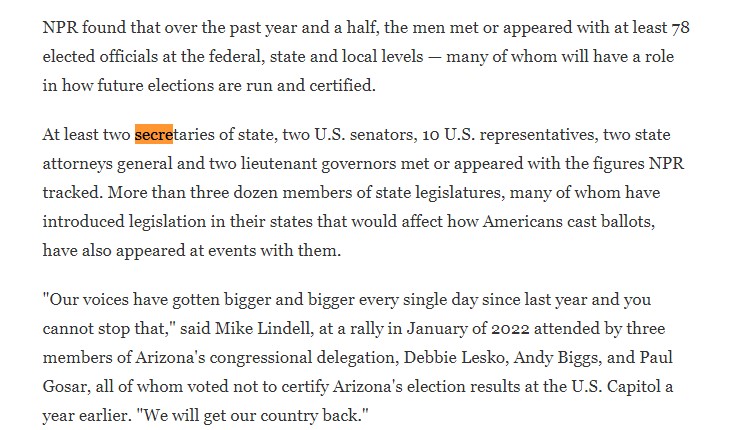NPR did a report on the ubiquity of election deniers and the scope of their national campaign to destabilize democracy. Punch a pillow, because there’s yet more deniers’ mischief ahead for the 2022 election.
The movement, once headquartered on Donald Trump's twitter account, has moved to churches, backyards, and car dealerships in communities across the U.S.
NPR tracked four of the most prominent election deniers over the past 18 months, as they crisscrossed the country, spreading the gospel of voter fraud.
We tracked:
Mike Lindell
Douglas Frank
David Clements
Seth Keshel
They appeared at at least 308 events, in 45 states+DC
In some cases these events were rallies or conferences - large groups of conspiracy-minded people.
In others, they were hyper-local "education" meetings, meant to bring regular people into the fold.
It's clear that election denial is building a grassroots infrastructure
Those local meetings often end with action items, for people to effect change in their communities.
At the end of one event
@NPR attended, David Clements closed by asking people in the audience to go to the offices of their county commissioners.
"They respond to fear," he said.
Even as voting officials everywhere have spent the past two years fighting disinformation.... These influencers only seem to be gaining steam:

The four men also used their newfound influence to rub elbows with lawmakers - at least 78 we found -many of whom will have a role in certifying elections in the future.

@mentionsacquired audio of a meeting between one of these men, Doug Frank, and elections staff from the Ohio Secretary of State's office. Frank tries to convince him of his fraud claims, but they don't budge.
Tune into
in 10 minutes, to hear that exchange and more
• • •
...Hoping the nuttiest contenders in these contests for election-related posts will lose is not a viable plan; it’s a recipe for disaster. (Didn’t millions of people make that error in 2016?) Instead of wishful thinking, the media, Democrats, independents, sane Republicans, donors and retired officials all have a role to play to defend the sanctity of elections.
First, the media has an obligation to identify the election deniers running for these critical roles, confront their lies and refuse to treat them like ordinary politicians. No responsible editorial board should endorse election deniers for posts with responsibility for elections.
Second, Democrats from President Biden on down must focus their fire on election deniers and persuade voters that no policy issue justifies putting these people in office. Biden will need to give more than a single speech; he will need to campaign coast to coast to convince voters it is essential not to put (or keep) in office people who would deny Trump’s betrayal and encourage insurrection as a political tool.
Democrats should invite independents and democracy-loving Republicans to vote against election deniers, particularly those who would administer elections. Nominees running against such candidates should make every effort to reach out to those who would ordinarily vote Republican and make clear that they’ll listen to their views, represent their interests and protect democracy on their behalf.
Third, responsible Republicans politicians (looking at you, Sen. Mitt Romney), retired politicians (that’s you, former president George W. Bush), sober Republican donors and former GOP officials (now is your chance to earn redemption, former attorney general William P. Barr) should use their influence to defeat the deniers. They aren’t going to reach the hardcore MAGA voters, but they can influence run-of-the-mill Republican voters or Republican-leaning voters.
www.washingtonpost.com/…
The potential for far-right Republicans to reshape the election systems of major battleground states is growing much closer to reality.
As the halfway point nears of a midterm year that is vastly friendlier to Republicans, the party’s voters have nominated dozens of candidates for offices with power over the administration and certification of elections who have spread falsehoods about the 2020 presidential contest and sowed distrust in American democracy.
The only way to restore trust, these candidates say, is by electing them.
In Michigan, Pennsylvania and now Nevada, Republican voters have elevated candidates who owe their political rise to their amplification of doubts about Joseph R. Biden Jr.’s victory, and who are now vying in elections for governor, secretary of state and attorney general — offices that will hold significant sway over the administration of the 2024 presidential election in critical swing states.
The rise of election deniers is far from over. Primary contests coming later this month in Colorado and in early August in Arizona and Wisconsin will provide more clarity on the depth of Republican voters’ desire to rally behind candidates devoted to the false idea that the 2020 election was stolen from former President Donald J. Trump.
With Republicans widely predicted to make gains in November, it is possible that 2023 will bring newly installed far-right officials willing to wield their influence to affect election outcomes and a possible Supreme Court ruling that could give state legislatures unchecked power over federal elections. Even some Republican candidates and officials who for a time defended the 2020 results as legitimate have begun to question whether Mr. Biden’s victory was on the level.
“We are in a dangerous place at the moment,” said Ben Berwick, the counsel for Protect Democracy, a nonpartisan group dedicated to resisting authoritarianism. “There is a substantial faction in this country that has come to the point where they have rejected the premise that when we have elections, the losers of the elections acknowledge the right of the winner to govern.”
www.nytimes.com/...


